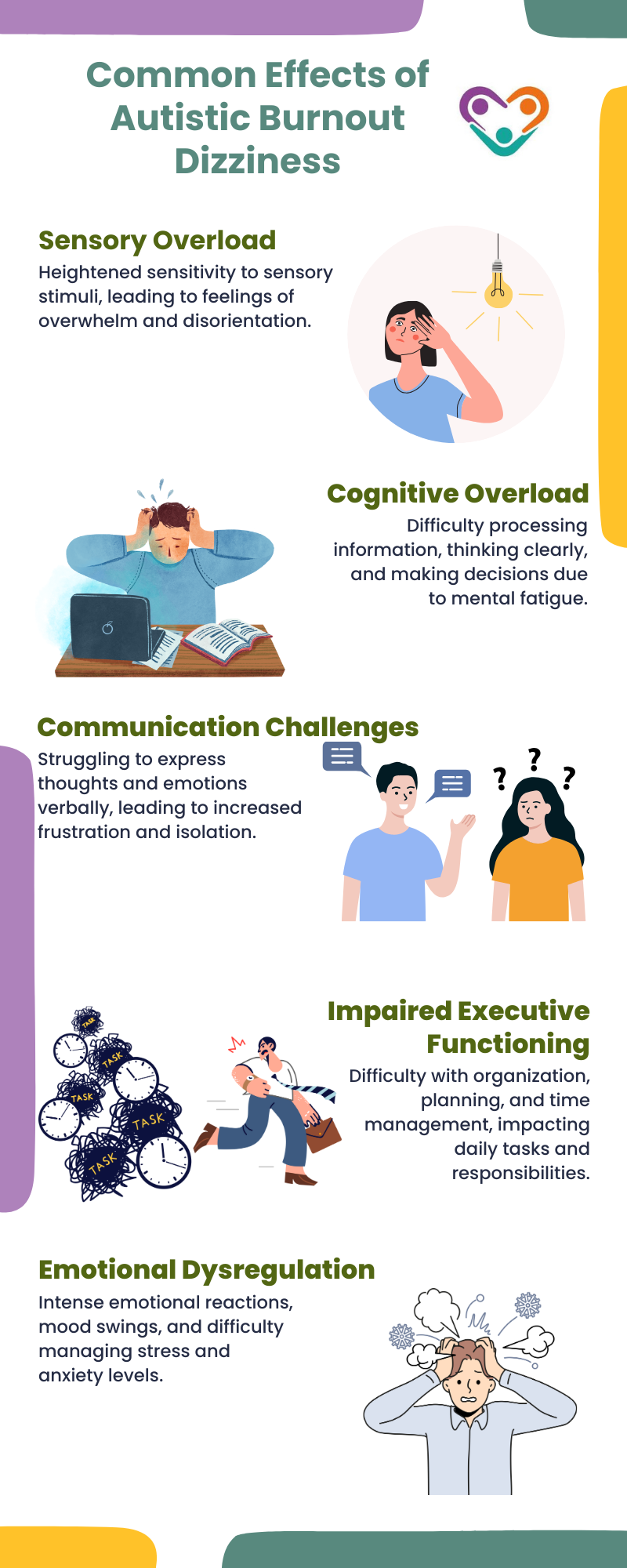
Table of Contents
Autistic burnout dizziness is a term used to describe the experience of feeling overwhelmed, disoriented, and mentally fatigued as a result of prolonged stress or sensory overload.
Individuals on the autism spectrum may encounter this sensation, which can manifest as dizziness, vertigo, or a sense of instability.
That said, autistic burnout dizziness is not a medical condition in itself but rather a complex interplay of psychological and sensory factors that can significantly impact the individual’s quality of life.
Recognizing Symptoms and Triggers
Recognizing the symptoms and triggers of autistic burnout dizziness is crucial for early intervention and support. Some common signs of this phenomenon include:
- Dizziness or lightheadedness
- Fatigue and exhaustion
- Sensory sensitivity
- Cognitive difficulties
- Emotional distress
Identifying the triggers that can exacerbate autistic burnout dizziness is also essential. These triggers may vary from individual to individual but can include:
- Prolonged exposure to sensory stimuli
- High levels of stress
- Lack of adequate rest and self-care
- Unpredictable or chaotic routines
Understanding the nature of autistic burnout dizziness and being mindful of its symptoms and triggers helps individuals, their families, and caregivers better navigate and address the challenges associated with this phenomenon.
Impact on Individuals with Autism
Living with autistic burnout dizziness can have profound effects on autistic individuals’ everyday life. Understanding these impacts and implementing coping strategies and support systems are crucial in managing this challenging condition.
Autistic burnout dizziness can significantly disrupt daily routines and activities for individuals with autism. Some common effects include:

In navigating the challenges posed by autistic burnout dizziness, individuals with autism can benefit from various coping strategies and support mechanisms tailored to their unique needs. Some effective strategies include:
- Sensory regulation techniques
- Structured routines
- Communication aids
- Mindfulness practices
- Behavioral therapy
Support for Parents and Caregivers
Navigating the challenges of autistic burnout dizziness can be overwhelming for both individuals with autism and their caregivers. Parents and caregivers should be able to recognize the signs of burnout in autistic individuals and provide effective support and understanding during these difficult times.
Providing effective support and understanding is crucial in helping autistic individuals navigate burnout dizziness. Here are some strategies that parents and caregivers can implement to offer meaningful support:
- Open Communication: Create a safe and open environment for individuals with autism to express their feelings and concerns without judgment. Encourage open communication to understand their needs better.
- Establish Routine: Help establish a consistent daily routine that promotes stability and predictability. Routines can provide a sense of comfort and security for individuals experiencing burnout.
- Offer Sensory Support: Implement sensory-friendly strategies and accommodations to reduce sensory overload and create a calming environment. Use tools like noise-canceling headphones or weighted blankets to provide comfort.
- Encourage Self-Care: Promote self-care practices that help individuals with autism manage stress and anxiety. Encourage activities that promote relaxation and emotional well-being, such as mindfulness exercises or hobbies.
Recognizing the signs of burnout in autistic individuals and providing consistent support and understanding allows parents and caregivers to play a vital role in empowering individuals with autism to cope with burnout dizziness and navigate their mental health challenges effectively.
When to Seek Professional Help
Individuals experiencing autistic burnout dizziness may benefit from seeking professional help to manage their symptoms and improve their overall well-being. Understanding the available therapy options and the importance of mental health support is crucial in effectively addressing autistic burnout dizziness.
Therapy can play a vital role in helping individuals with autism navigate the challenges associated with burnout dizziness. Some common therapy options that individuals may consider include cognitive behavioral therapy (CBT), occupational therapy, sensory integration therapy, and mindfulness-based stress reduction techniques.
These therapy options can be tailored to meet the individual needs of those experiencing burnout dizziness, providing them with effective tools to cope with sensory issues and emotional distress.
Mental health support is also a cornerstone of managing autistic burnout dizziness and promoting overall well-being. Individuals with autism may face unique challenges related to their mental health, and seeking professional help can offer them the necessary resources and strategies to navigate these difficulties.
It can provide a handful of benefits such as:
- Providing a safe space to discuss feelings, experiences, and challenges related to burnout dizziness.
- Offering coping strategies and tools to manage stress, anxiety, and sensory overload effectively.
- Promoting self-awareness and emotional regulation, empowering individuals to address their mental health needs.
Empowering Through Education and Advocacy
Amidst the challenges posed by autistic burnout dizziness, raising awareness about this phenomenon becomes a crucial step toward fostering understanding and support within the community.
Promoting inclusivity and acceptance plays a vital role in empowering individuals with autism to navigate their experiences more effectively.
Raising Awareness About Autistic Burnout
Increasing awareness about autistic burnout dizziness involves educating both the general population and individuals within the autism community about the complexities and impact of this condition. By shedding light on the signs, symptoms, and triggers of autistic burnout, misconceptions can be dispelled, and a more supportive environment can be cultivated.
One effective way to raise awareness is through educational campaigns, workshops, and informational resources that provide insights into the challenges faced by individuals experiencing autistic burnout.

Promoting Inclusivity and Acceptance
In tandem with raising awareness, promoting inclusivity and acceptance is instrumental in creating a supportive and inclusive environment for individuals with autism. Embracing neurodiversity and recognizing the unique strengths and challenges of individuals on the autism spectrum helps foster a sense of belonging and understanding within the community.
Promoting inclusivity involves creating spaces and opportunities that accommodate the diverse needs of individuals with autism. By advocating for access to tailored support services, inclusive education, and employment opportunities, barriers to participation can be reduced, and individuals can thrive in environments that value their contributions.
Final Thoughts
Autistic burnout dizziness is a real and challenging experience for many people on the autism spectrum. It’s more than just feeling tired or overwhelmed – it’s a deep sense of exhaustion that affects both the mind and body, often accompanied by physical symptoms like dizziness. Understanding this aspect of autism can help us provide better support and create more inclusive environments.
If you or someone you know is struggling with these feelings, it’s important to reach out for help, take breaks, and practice self-care to manage the burnout and find relief. At Golden Care Therapy, we offer compassionate and tailored ABA therapy in Indiana, designed to support individuals and families through their unique challenges.
Don’t hesitate to contact us today, and let’s work together to create a path to a more balanced and fulfilling life. We’re here for you every step of the way!
Sources:
- The Connection Between Autism and Mood Disorders - October 22, 2024
- Autistic Shutdown vs Depression: How They Differ - October 22, 2024
- Does ADHD Cause Procrastination? - October 22, 2024
